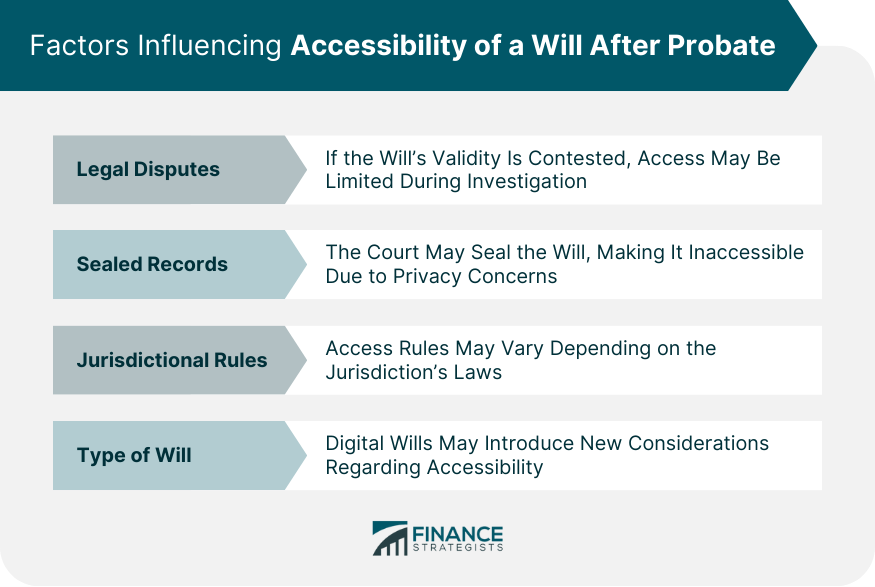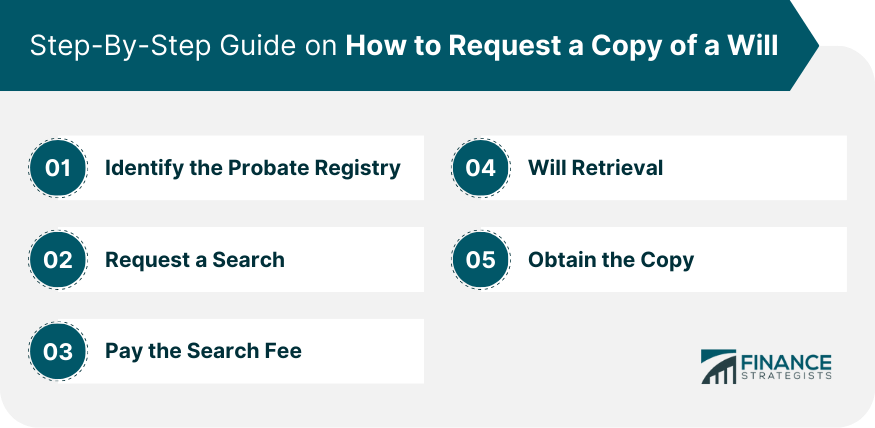After an individual passes away, their estate usually undergoes a legal process called probate. Probate involves validating the will, resolving debts, paying taxes, and ultimately distributing the assets to the beneficiaries according to the instructions outlined in the will. In general, once the probate process is complete, the will becomes a public record and can be accessed by anyone. This means that you should be able to obtain a copy of a will after probate. However, the exact process for obtaining a copy may vary depending on the jurisdiction and local laws. To obtain a copy of a will after probate, you can typically contact the probate court where the will was filed and request a copy. Some jurisdictions may require you to submit a formal request, pay a fee, or provide proof of your relationship to the deceased person. The availability of a copy of the will after probate may also depend on the specific circumstances and any restrictions or provisions included in the will itself. Once a will has been submitted to the probate court, it generally becomes a public document. This is because the probate process is a matter of public record. It allows interested parties to challenge the will if they believe it to be invalid or suspect foul play. This public status means that anyone, not just those directly involved in the will or probate process, can access the document. Certain factors can influence the accessibility of a will after probate. These can include whether the will was contested or if there are ongoing legal disputes related to the will. One factor that can limit the accessibility of a will post-probate is legal disputes. If the will is under contestation, which means someone is challenging its validity, access to the will may be restricted during the investigation. The reason for this is to protect the integrity of the legal process and the interests of all parties involved. In rare circumstances, the court may choose to seal the records, thereby making the will inaccessible to the public. This is generally done when the court determines that releasing the will could violate privacy rights or potentially cause harm to individuals named in the will. The rules for accessing a will after probate can also vary depending on the jurisdiction. Different states or countries may have different laws regarding the accessibility of probate records, which include wills. It can also affect its accessibility post-probate. For instance, the emergence of digital wills, which are created, signed, and stored electronically, introduces a new set of considerations. Although the process of obtaining a copy of a digital will after probate may be similar to that of a paper will, there may be additional considerations, such as digital security and the integrity of the electronic probate record. While will become public records after they've been submitted to probate, certain individuals have more direct access rights. These generally include the executor, the heirs, and any creditors of the estate. Legally, individuals entitled to a copy of the will include the named executor, named beneficiaries, and possibly creditors. The executor is responsible for managing the estate, and as such, they need access to the will to carry out their duties. Beneficiaries have a right to understand the exact provisions made for them, and creditors need to know if there is any provision for debts to be paid. Typically, to obtain a copy of the will, you must contact the probate court in the county where the decedent lived. They can guide you through the process of requesting a copy of the will. This usually involves filling out a form and paying a fee. If you are not a direct party to the will, you may have to explain your interest in the document. In some jurisdictions, wills are registered with a Probate Registry or similar entity, making the process of obtaining a copy more straightforward. A Probate Registry is a public office where wills are registered once they have been validated through the probate process. This registry functions as a repository of wills and allows for easy access to these important documents. While the will is a public record, the process of obtaining a copy isn't always free. Most probate registries or courts charge a fee to search for and provide a copy of the will. The fee can vary depending on the location and the length of the document. It's always a good idea to inquire about potential fees before starting the process. Determine the specific Probate Registry that handles the estate in question. This is typically based on the jurisdiction where the deceased person resided at the time of their death. Contact the Probate Registry and request a search for the decedent's will. Provide relevant information such as the full name and date of death of the individual. Some Probate Registries may require a fee for conducting the search. Inquire about the applicable fee and submit payment as instructed. If the will is located during the search, you can proceed with requesting a copy. Typically, this involves submitting a formal request and paying an additional fee for obtaining the copy. Once the request is processed and the necessary fees are paid, the Probate Registry will provide you with a copy of the will. This may be in physical or digital format, depending on the registry's procedures. Even though probate is generally a matter of public record, there are circumstances in which access to a will may be limited or restricted. On rare occasions, the court may decide to seal a will, making it inaccessible to the public. This generally happens when the court determines that making the will public could lead to privacy violations or cause harm to individuals named in the document. If a will is being contested—meaning someone is challenging its validity—the court may restrict access to the will during the investigation. This is to maintain the integrity of the legal process and protect the interests of all parties involved. Beyond contesting the will itself, other legal disputes can affect accessibility. For example, if there's a legal dispute between the heirs, the court may decide to restrict access until the dispute is resolved. As technology advances, so does the world of estate planning. Digital wills are a new and evolving aspect of this field that introduces some unique considerations. A digital will is a will that is created, signed, and stored electronically. While they are not yet universally accepted due to concerns over their vulnerability to fraud, they are legal in some jurisdictions. The process of obtaining a copy of a digital will after probate can be similar to that of a paper will. However, there may be additional considerations such as digital security and the electronic probate record's integrity. Some digital will platforms provide easy online access to the will upon death and the completion of the probate process. Getting a copy of a will after probate is generally feasible, given that wills typically become public documents post-probate. The process involves reaching out to the probate court or Probate Registry, submitting a request, and usually paying a nominal fee. However, access could be influenced by factors like legal disputes, contested wills, or instances where the will is sealed due to privacy concerns. Additionally, digital wills, an emerging facet of estate planning, might involve different considerations for access and security. It's essential to understand these nuances if you're an executor, beneficiary, or creditor with a legitimate interest in the document or even a researcher or member of the public. Remember, the exact process can vary depending on the jurisdiction and specific circumstances, so legal counsel may be necessary.Can I Get a Copy of a Will After Probate?
General Rules About Will Accessibility Post-Probate
Factors Influencing Accessibility of a Will After Probate
Legal Disputes
Sealed Records
Jurisdictional Rules
Type of Will

Legal Rights to Access a Will After Probate
Individuals Legally Entitled to Access the Will
Legal Procedure for Obtaining a Copy of the Will
Obtaining a Copy of a Will From the Probate Registry
Step-By-Step Guide on How to Request a Copy of a Will
Step 1: Identify the Probate Registry
Step 2: Request a Search
Step 3: Pay the Search Fee
Step 4: Will Retrieval
Step 5: Obtain the Copy

Situations Where Access to the Will May Be Restricted
Sealed Records and Privacy Issues
Cases Where Wills Are Contested
Legal Disputes
Digital Wills and Their Accessibility Post-Probate
Overview of Digital Wills
Specific Considerations for Obtaining a Digital Will After Probate
Conclusion
Can I Get a Copy of a Will After Probate? FAQs
Yes, but the accessibility may be limited during the legal proceedings. If a will is being contested, access might be restricted until the matter is resolved to protect the interests of all parties involved.
Generally, no. In rare cases, the court may seal a will, rendering it inaccessible to the public. This is usually done when there's a risk of violating privacy rights or causing harm to those named in the will.
Yes, you can generally get a copy of a digital will after probate. The process is similar to getting a copy of a traditional paper will. However, there may be additional considerations such as digital security and the electronic probate record's integrity.
Yes, but the process may vary depending on the specific laws and regulations of the jurisdiction where the will was probated. Some jurisdictions may require you to demonstrate a legitimate interest in the will before granting access.
Most probate courts or registries charge a fee to provide a copy of a will. This fee varies based on the location and the length of the will. In some jurisdictions, there may also be a fee to search for the will. It's recommended to inquire about potential fees before starting the process.
True Tamplin is a published author, public speaker, CEO of UpDigital, and founder of Finance Strategists.
True is a Certified Educator in Personal Finance (CEPF®), author of The Handy Financial Ratios Guide, a member of the Society for Advancing Business Editing and Writing, contributes to his financial education site, Finance Strategists, and has spoken to various financial communities such as the CFA Institute, as well as university students like his Alma mater, Biola University, where he received a bachelor of science in business and data analytics.
To learn more about True, visit his personal website or view his author profiles on Amazon, Nasdaq and Forbes.











